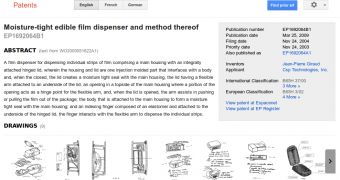Google is a big opponent of software patents and patents in general, but it still bought them by the thousands when it became clear that it was the only way to survive. It's a major reason why it bought Motorola in the first place. But Google still hopes the patent system will get better if not die out entirely.
That seems to be the thinking behind a brand new patent search tool that now incorporates data from the European Patent Office along with the existing data from the US homologue.
The idea is to make it easier to find prior art to a patent application, either in existing patents, or in books or even online.
One of the big problems with the existing patent system is that employees tasked with validating them are swamped and don't have the time or the resources to properly do their research.
"Typically, patents are granted only if an invention is new and not obvious. To explain why an invention is new, inventors will usually cite prior art such as earlier patent applications or journal articles," Google explained.
"Determining the novelty of a patent can be difficult, requiring a laborious search through many sources, and so we’ve built a Prior Art Finder to make this process easier. With a single click, it searches multiple sources for related content that existed at the time the patent was filed," it said.
Currently, because patent office employees have so much work to do and because they are incentivized to approve as many patents as possible and keep the system going, to ensure they have a job in the future, many shoddy patents get approved.
Google seems to think that the new tool will be useful to those wanting to apply for a patent. But that's assuming that they're acting in good faith and that the existence of prior art will dissuade them from going forward with the application. That's a very naive assumption to say the least.
More useful, though, the tool will prove the patent office employees who actually want to do their job well. That seems like a very limited market, but it shows that Google is willing to go through all of this trouble to build a tool useful to only a handful of people in the hopes that patents will be of better quality in the future.

 14 DAY TRIAL //
14 DAY TRIAL //